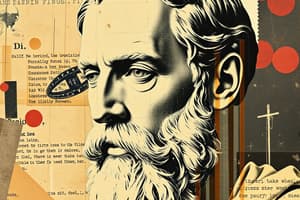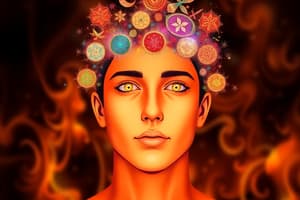Podcast
Questions and Answers
What is self-awareness?
What is self-awareness?
The ability to recognize and understand one's own emotions, thoughts, and values.
Which of the following are components of self-awareness? (Select all that apply)
Which of the following are components of self-awareness? (Select all that apply)
- Emotional Awareness (correct)
- Self-evaluation (correct)
- Self-reflection (correct)
- External validation
Immanuel Kant's view on the self is primarily focused on morality and autonomy.
Immanuel Kant's view on the self is primarily focused on morality and autonomy.
True (A)
What philosophical view asserts that the mind and body are separate entities?
What philosophical view asserts that the mind and body are separate entities?
What concept suggests that our bodily experiences shape our identity?
What concept suggests that our bodily experiences shape our identity?
Which philosopher is known for the idea 'Cogito, ergo sum'?
Which philosopher is known for the idea 'Cogito, ergo sum'?
What practice enhances self-awareness by focusing on the present moment?
What practice enhances self-awareness by focusing on the present moment?
Flashcards are hidden until you start studying
Study Notes
Understanding the Self
Self-awareness
- Definition: The ability to recognize and understand one's own emotions, thoughts, and values.
- Components:
- Emotional Awareness: Identifying and naming emotions.
- Self-reflection: Analyzing thoughts and behaviors.
- Self-evaluation: Assessing oneself honestly and objectively.
- Benefits:
- Improved decision-making.
- Enhanced emotional intelligence.
- Better interpersonal relationships.
Philosophers
- Socrates: Advocated for self-knowledge with the idea "Know thyself" as a path to wisdom.
- René Descartes: Introduced the concept "Cogito, ergo sum" ("I think, therefore I am"), emphasizing thought as the essence of self.
- Immanuel Kant: Explored the self in the context of morality and autonomy, asserting that individuals are rational agents.
- Friedrich Nietzsche: Challenged traditional notions of self, promoting the idea of self-creation and the "will to power."
- Martin Heidegger: Focused on being and existence, proposing that understanding the self is tied to the concept of being-in-the-world.
Body and Mind
- Dualism: The philosophical view that the mind and body are separate entities (e.g., Descartes).
- Monism: The idea that mind and body are unified (e.g., Spinoza's views).
- Embodiment: The concept that the self is experienced through the physical body; our bodily experiences shape our identity.
- Neuroscience Perspective:
- Highlights the interaction between brain activity and self-perception.
- Explores how physical states (e.g., health, fatigue) affect mental states and self-identity.
- Mindfulness: A practice that enhances self-awareness by focusing on the present moment and fostering a connection between body and mind.
Self-awareness
- Definition: Recognizing and understanding personal emotions, thoughts, and values is crucial for self-awareness.
- Components:
- Emotional Awareness: Involves the ability to identify and name one's emotions in various situations.
- Self-reflection: Engaging in the analysis of personal thoughts and behaviors to gain insights into oneself.
- Self-evaluation: The practice of assessing oneself in an honest and objective manner, encouraging growth and improvement.
- Benefits:
- Improves decision-making by fostering a deeper understanding of oneself.
- Enhances emotional intelligence, leading to better recognition of emotions in oneself and others.
- Facilitates better interpersonal relationships due to increased empathy and understanding.
Philosophers
- Socrates: Promoted self-knowledge as essential, famously stating "Know thyself" as a gateway to wisdom.
- René Descartes: Introduced "Cogito, ergo sum" ("I think, therefore I am"), focusing on thought as fundamental to the self.
- Immanuel Kant: Examined the self in relation to morality and autonomy, asserting that individuals act as rational agents informed by ethical principles.
- Friedrich Nietzsche: Encouraged the idea of self-creation and the empowerment of the "will to power," challenging traditional self-conceptions.
- Martin Heidegger: Tied the understanding of the self to the notion of being-in-the-world, emphasizing existence and context.
Body and Mind
- Dualism: A philosophical stance that posits the mind and body as separate, a view famously put forth by Descartes.
- Monism: Argues for the unity of the mind and body, as seen in Spinoza's philosophical insights.
- Embodiment: Suggests that the self is experienced through the physical body, with bodily experiences significantly shaping personal identity.
- Neuroscience Perspective:
- Investigates the dynamic interactions between brain activity and self-perception.
- Studies how physical states, such as health and fatigue, influence mental states and aspects of self-identity.
- Mindfulness: A technique that strengthens self-awareness by concentrating on the present, fostering a connection between body and mind.
Studying That Suits You
Use AI to generate personalized quizzes and flashcards to suit your learning preferences.




